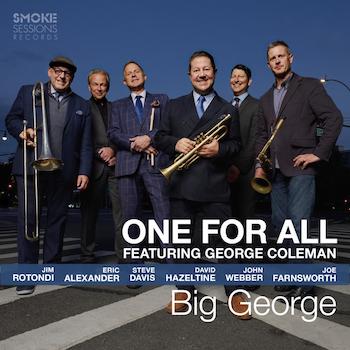Jazz Album Review: Tenor Saxophonist George Coleman Is in Command on One for All’s “Big George”
By Michael Ullman
Big George is polished, tonally elegant, and beautifully recorded
One for All, featuring George Coleman: Big George (Smoke Sessions)

One for All is a sextet comprising what hip people used to call solid senders, musical swingers who were masters of their craft and instruments. These veterans are trumpeter Jim Rotondi, saxophonist Eric Alexander, trombonist Steve Davis, pianist David Hazeltine, bassist John Webber, and drummer Joe Farnsworth. The “George” of Big George is guest tenor saxophonist George Coleman, an 88-year-old who is featured on three of the nine tracks.
Coleman’s a wonder. In the ’50s he appeared on half a dozen Max Roach albums, including The Max Roach Four Plays Charlie Parker, and later on such classics as Herbie Hancock’s Maiden Voyage, Lee Morgan’s City Lights, Booker Little’s Four and the jam session that became Jimmy Smith’s House Party. Later he performed on Mingus’s Three or Four Shades of Blue. Still, to my generation he is best known for his stint in the mid-’60s with Miles Davis. Coleman wasn’t always adequately appreciated. He was no John Coltrane, but then neither was Hank Mobley, his predecessor in the Davis quintet. The recordings include Miles Davis in Europe. He sounds fine to me: Coleman’s solo on “Autumn Leaves” seems to energize the already extroverted drummer Tony Williams. Davis praised Coleman’s musicianship, but he doesn’t play on the ballad “I Thought About You,” and on my original LP Miles Davis in Europe, his solo is cut on “Walkin’.” The saxophonist went on to do remarkable things anyway, including play with the hard boppish One for All while in his late 80s.
One for All, the group, is hardly new: the sextet was formed in 1997 for a gig at Smalls, and they’ve recorded (according to my count) 16 hard-bopping albums since. The sextet got its name from Art Blakey’s last recording, an LP on which trombonist Steve Davis also played. (Blakey might have gotten it from the Three Musketeers.) Big George consists of a half dozen beautifully executed, instantly appealing originals, a Hank Mobley tune (“This I Dig of You”) which has become a Coleman feature, the ballad “My Foolish Heart,” and Hoagy Carmichael’s “The Nearness of You.”
The set opens with Eric Alexander’s sassy blues “Chainsaw.” Alexander says the name came from his desire to have a two-syllable title: somehow the film Texas Chainsaw Massacre came into his head. It starts with a couple bars of solo drums: Joe Farnsworth plays the rhythm of the melody. Then the relatively simple, swinging melody is played precisely and warmly by the horns. They manage to sound like a single voice without being uptight. This listener was immediately relaxed into it: listening to “Chainsaw” feels like sinking into a plush armchair. Trumpeter Rotondi takes the first solo, followed by Eric Alexander, Davis, and Hazeltine. Remarkable in themselves, the solos flow into each other with grace and ease.
Interestingly, the first three pieces, including Davis’s “In the Lead”and Jim Rotondi’s “Edgerly,” start with the drums. “My Foolish Heart,” a favorite with pianist Bill Evans, is dominated by Coleman’s tenor. His large, expressive tone and occasional daring are the focus of the performance, but I must also praise the exposed bass playing of John Webber. I admire the constant, low-key inventiveness of Coleman, who leaves space so the rhythm section can breathe. At one point, Farnsworth pushes Coleman with a drum roll, and the ballad becomes something that swings as well. The saxophonist solos while the horns play sweet-sounding long tones toward the end. The band just sounds good.
Coleman is the focus of the Hank Mobley tune “This I Dig of You,” which tenor saxophonist Mobley introduced in 1960 on his popular Soul Station. Here I would point out pianist Hazeltine’s fluent, substantial solo, and the general good time feel. Another highlight is Davis’s warm tone along with his rounded phrasing on “The Nearness of You.” This is hard bop, maybe, but it’s not as feisty or funky as some of the ’60s classics. Big George is polished, tonally elegant, and beautifully recorded: I imagine some musicians might want to cover One for All’s originals.
Michael Ullman studied classical clarinet and was educated at Harvard, from which he received a PhD in English. The author or co-author of two books on jazz, he has written on jazz and classical music for the Atlantic Monthly, New Republic, High Fidelity, Stereophile, Boston Phoenix, Boston Globe, and other venues. His articles on Dickens, Joyce, Kipling, and others have appeared in academic journals. For over 20 years, he has written a bimonthly jazz column for Fanfare Magazine, for which he also reviews classical music. At Tufts University, he teaches mostly modernist writers in the English Department and jazz and blues history in the Music Department. He plays piano badly.
